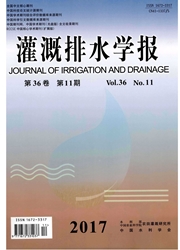

 中文摘要:
中文摘要:
基于大田试验。研究了喷灌对冬小麦籽粒形成期植株氮代谢和籽粒蛋白质合成的影响。结果表明,开花后,小麦旗叶硝酸还原酶(NR)和谷氨酰胺合成酶(GS)活性逐步下降,而小麦籽粒NR和GS活性随着生育期的推进而逐步提高,并于花后14d达到最高,之后逐步下降。与地面灌溉相比,喷灌条件下小麦旗叶与籽粒的NR和GS活性均显著提高;开花后0~28d旗叶和籽粒中游离氨基酸显著提高,开花28d后喷灌旗叶和籽粒游离氨基酸与地面灌溉无显著差异;喷灌有利于旗叶灌浆前期和中期游离氨基酸的积累以及灌浆期间向籽粒的再分配。喷灌下,小麦籽粒蛋白质上升,醇溶蛋白和谷蛋白显著增加,但清蛋白和球蛋白变化不显著。可见,喷灌有利于提高中筋小麦植株氮代谢的关键酶活性,一定程度上改善小麦蛋白质加工品质。
 英文摘要:
英文摘要:
Field experiments were conducted to to study the effects of sprinkler irrigalion on plant nitrogen metabolism and grain protein synthesis of medium-gluten wheat cultivar. The results showed that: during grain filling stage, activities of nitrate reductase (NR) and glutamine synthetase (GS) in the flag leaves gradually decreased while activities of NR and GS in the grains increased and reached the top after anthesis for 14 d, but decreased then. Compared with those under surface irrigation, activities of NR and GS in wheat leaves and grains, and contents of free amino acid in flag leaves and grains after anthesis for 0~28 d all increased significantly under sprinkler irrigation. Sprinkler irrigation was of benefit to the accumulation of free amino acid during early and middle grain filling stages and the redistribution to grains during the whole grain filling stage. Under sprinkler irrigation, the total protein content and the contents of gliad and glutelin in wheat grains increased, and'the changes of album and globulin contents were not significant. Sprinkler irrigation could promote the enzyme activities in nitrogen metabolism of medium-gluten wheat, and improve the processing quality properties of wheat grain in a certain extent.
 同期刊论文项目
同期刊论文项目
 同项目期刊论文
同项目期刊论文
 期刊信息
期刊信息
